KPackageKit/ca: Difference between revisions
Created page with "Si coneixeu el nom del paquet, simplement escriviu-lo a la ''barra de cerca'' -el valor per omissió és cercar per nom-." |
Created page with "Suposem, però, que necessiteu suggeriments per als paquets adequats. Aquesta vegada haureu d'escollir <menuchoice>Cerca per descripció</menuchoice>. Per exemple, si escriviu «..." |
||
| Line 22: | Line 22: | ||
{{Note/ca|Les cerques són lentes, atès que s'ha de consultar la base de dades de paquets -tant una de local com per a cada repositori-. Trobareu que mentre treballa ho fa lentament.}} | {{Note/ca|Les cerques són lentes, atès que s'ha de consultar la base de dades de paquets -tant una de local com per a cada repositori-. Trobareu que mentre treballa ho fa lentament.}} | ||
Suposem, però, que necessiteu suggeriments per als paquets adequats. Aquesta vegada haureu d'escollir <menuchoice>Cerca per descripció</menuchoice>. Per exemple, si escriviu «flaac» al terme de cerca i llavors escolliu <menuchoice>Cerca per descripció</menuchoice> se us mostraran tots els paquets relacionats amb l'ús de fitxers «flaac». Els paquets instal·lats mostraran una «X» vermella (s'usarà per si cal treure alguna cosa) i els paquets disponibles tenen una fletxa cap avall de color blau. | |||
So - you have a list of suitable files. Click on one of them and a panel opens giving you a description of the file. (Enlarge the image above to see this, then use your browser's <menuchoice>Back</menuchoice> button to return here.) There are three other options to display - a list of files included in the package, a list of dependencies (which will be automatically handled if you choose to install) | So - you have a list of suitable files. Click on one of them and a panel opens giving you a description of the file. (Enlarge the image above to see this, then use your browser's <menuchoice>Back</menuchoice> button to return here.) There are three other options to display - a list of files included in the package, a list of dependencies (which will be automatically handled if you choose to install) | ||
Revision as of 00:59, 10 April 2011
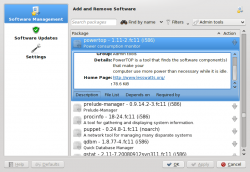 |
Una eina gràfica per a gestionar els paquets. |
Característiques
- Gestiona la instal·lació i desinstal·lació de paquets.
- Gestiona l'actualització de paquets.
- Es poden cercar paquets per nom, descripció o nom de fitxer dintre del paquet.
- Suporta filtrat.
- instal·lats o disponibles.
- Lliure o no lliure («free» o «non-free»).
- Usuari final o e en desenvolupament.
- Gràfic o de només text.
- Es poden veure els paquets en grups.
Instal·lació de paquets
Si coneixeu el nom del paquet, simplement escriviu-lo a la barra de cerca -el valor per omissió és cercar per nom-.
Suposem, però, que necessiteu suggeriments per als paquets adequats. Aquesta vegada haureu d'escollir . Per exemple, si escriviu «flaac» al terme de cerca i llavors escolliu se us mostraran tots els paquets relacionats amb l'ús de fitxers «flaac». Els paquets instal·lats mostraran una «X» vermella (s'usarà per si cal treure alguna cosa) i els paquets disponibles tenen una fletxa cap avall de color blau.
So - you have a list of suitable files. Click on one of them and a panel opens giving you a description of the file. (Enlarge the image above to see this, then use your browser's button to return here.) There are three other options to display - a list of files included in the package, a list of dependencies (which will be automatically handled if you choose to install)
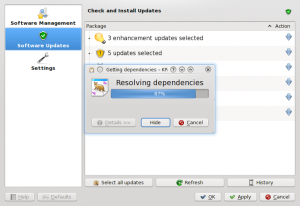
and a list of applications that depend upon the package you choose.
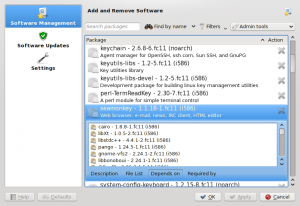
Having found the application that is best for you, click on the down-arrow and you will see both the package icon and the action icon become active. Click OK, and your package will be installed.
Actualització de paquets
The second section lists any packages for which updates are available. As before, the repos and your installation are queried, so there is a delay. When the list is created, it is presented in groups.
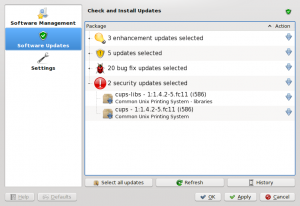
Again, dependencies are resolved when you agree to the download.
Les opcions de configuració
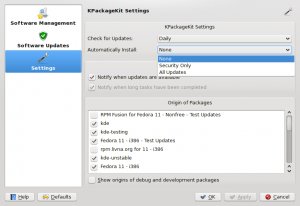
The third and final section of KPackageKit is the page. Here you can set the frequency of checking for updates, according to your need. The default is , but for an ultra-secure site you could choose Hourly, and for a lightly used one you can have or frequency.
Next is whether you want updates to be installed automatically. A nice touch is to be able to say that security updates should be automatically installed, but no other packages.
The next choice is whether you want the tray icon to notify you of available updates, and whether it should tell you when large jobs are finished.
The final section lists all the repos you have set up. Here you can enable or disable individual repos.
La icona a la safata del sistema
Finally, the tray icon can give you some information while your install or upgrade is progressing.

Here you can see the progress of your batch of updates or installs. A simple hover over the icon gives you a percentage reading of the job.

